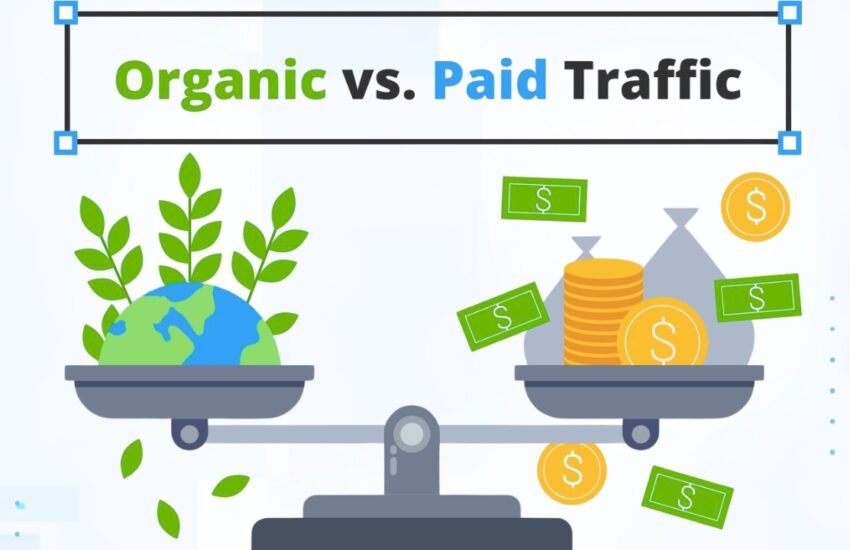In today’s digital marketing landscape, visibility is everything. Whether you’re running an online store, a blog, or a service-based business, you need to be found by your target audience. That’s where search engines come into play. But when it comes to increasing your online visibility, there are two primary approaches: organic search vs paid search.
These two methods share the same goal of increasing visibility, but they work very differently. In this blog post, we’ll compare organic search (SEO) and paid search (PPC), focusing on cost, speed, ROI, and long-term value. We’ll also discuss when to use each, how they can complement each other, and what most guides leave out. Let’s dive in!
What is Organic Search?
Organic search is the process of ranking naturally in search engine results pages (SERPs) without paying for placement. This type of traffic comes from search engine algorithms that prioritize websites based on relevance, authority, and content quality.
The main focus here is to create valuable content, optimize your site for search engines, and work towards earning rankings on the first page of search results for relevant keywords. Once you start ranking organically, you continue to get traffic without paying for each click, making this a long-term strategy.
Example:
If someone types “how to make your flowers last longer” into Google and lands on your flower business website, where you’ve written a blog post on flower care, that’s organic search at work. You didn’t pay for this click; it’s the result of your quality content ranking naturally.
What is Paid Search?
Paid search, also known as pay-per-click (PPC), is when you pay to appear at the top of the search engine results pages. Advertisers bid on specific keywords to place their ads in these paid spots, paying for each click they receive. The most popular paid search platform is Google Ads, which holds a significant share of the search engine market.
Paid search is all about getting immediate visibility and driving traffic quickly. While it can be costly, it offers fast results and allows advertisers to control exactly where and when they appear in the search results.
Example:
You’ve launched a flower delivery app and want to drive traffic and downloads immediately. You create a Google Ads campaign targeting the keyword “best flower delivery app.” As soon as your ad goes live, people searching for that term will see your ad at the top of the search results.
Key Differences: Organic Search vs Paid Search
Cost Comparison
When it comes to cost, organic search typically involves a higher upfront effort. You’ll need to invest in quality content creation, SEO optimization, and ongoing maintenance. However, once you start ranking, you won’t have to pay for each individual click, making it a more cost-effective long-term strategy.
In contrast, paid search is ongoing and subject to volatility depending on the competitiveness of your keywords. You’ll have to continually spend money on ads to maintain visibility. Paid search can be expensive, especially for highly competitive terms, but it provides instant results.
Speed of Results
One of the key advantages of paid search is its speed. With PPC, the moment your ad gets approved, it starts generating traffic immediately. This makes it an ideal choice for time-sensitive campaigns, product launches, or urgent business needs.
Organic search, on the other hand, takes time to see results. It requires consistent content creation, optimization, and backlink building to improve your rankings. Depending on competition and your site’s authority, it can take several months to see significant traffic from organic search.
ROI and Long-Term Value
While paid search can provide quick wins, it tends to stop working as soon as you stop paying for ads. This means it requires a continuous budget to maintain visibility.
On the other hand, organic search offers long-term value. Once your content starts ranking well, it can continue to bring in traffic for months or even years with little additional investment. SEO can have a lower customer acquisition cost (CAC) in the long run compared to paid ads, especially when considering the sustained traffic over time.
Traffic Quality
Paid search tends to attract users who are already ready to buy. They’re actively searching for specific products or services, and are usually further along in their buyer journey. This makes PPC traffic more likely to convert quickly.
Organic search, however, often attracts users who are in the research phase. They might be exploring options or gathering information, which means conversions can take longer. However, if your content is informative and engaging, it can build trust and credibility with these users, leading to higher-quality traffic in the long run.
When to Use Organic Search (SEO)
SEO works best when you want to introduce your brand to users at the beginning of their journey. Organic search targets users who are asking questions or looking for information. They may not be ready to buy yet, but you’re positioning your brand as a trustworthy source of information.
For example, a blog post titled “How to Make Your Flowers Last Longer” can educate users about flower care and build trust in your brand. You may not be making an immediate sale, but you’re increasing brand awareness.
When You Have a Long-Term Strategy
Organic search takes time to build, but the results last. Once your content starts ranking, you’ll continue to attract traffic without paying for each click. This makes SEO a great long-term strategy for businesses that want sustainable traffic and a low-cost way to grow their online presence over time.
When Content is Evergreen
SEO is highly effective for content that remains relevant over time. If you create content that answers questions or solves problems that people will continue to search for, it can generate long-term, sustainable traffic. Evergreen content like “how-to” guides or FAQs works perfectly for organic search.
When to Use Paid Search (PPC)
When You Need Quick Results
If you need to drive traffic fast—whether for a product launch, a seasonal campaign, or a time-sensitive promotion—paid search is your best option. PPC ads deliver immediate visibility and instant traffic, allowing you to generate results right away.
When You Want to Test Keywords
Paid search is an excellent tool for testing the performance of certain keywords before committing to them in your SEO strategy. By running a quick PPC campaign, you can gather valuable data on how well specific keywords perform, then decide whether to invest more in organic content for those keywords.
When Your Budget Allows Flexibility
If you have the budget for it, PPC can give you complete control over your traffic. With adjustable daily budgets and detailed targeting, you can experiment and scale based on real-time results.
How Organic Search and Paid Search Work Together
While SEO and PPC are often seen as competing strategies, they can actually work very well together. By using both, you can leverage the strengths of each channel and achieve better overall results.
- PPC for Immediate Results, SEO for Long-Term Gains: You can use PPC to drive immediate traffic while your SEO strategy takes time to build. For example, run a PPC campaign to promote a new product while optimizing your content to rank for related keywords over time.
- PPC for Keyword Testing: Use PPC campaigns to test which keywords are converting well, and then use that data to inform your organic search efforts.
- Retargeting PPC for SEO Visitors: When someone visits your site via SEO but doesn’t convert, you can use PPC retargeting ads to bring them back.
- Enhanced Visibility: Running both organic search results and PPC ads for the same keywords ensures you dominate the search results, increasing your visibility and credibility.
Conclusion
Both organic search and paid search offer unique advantages, depending on your goals, timeline, and budget. SEO is ideal for long-term visibility, building brand credibility, and generating sustainable traffic without ongoing costs. On the other hand, PPC delivers fast, actionable results, helping you reach customers when they’re ready to act, even if the costs can add up.
When used together, these two strategies can complement each other perfectly, driving both immediate results and long-term growth. Whether you’re focusing on one or both, understanding when and how to use each will help you maximize your digital marketing efforts and achieve the best possible ROI.
you may also like
Keyword Strategy Guide: Master SEO and Rank Higher Today



